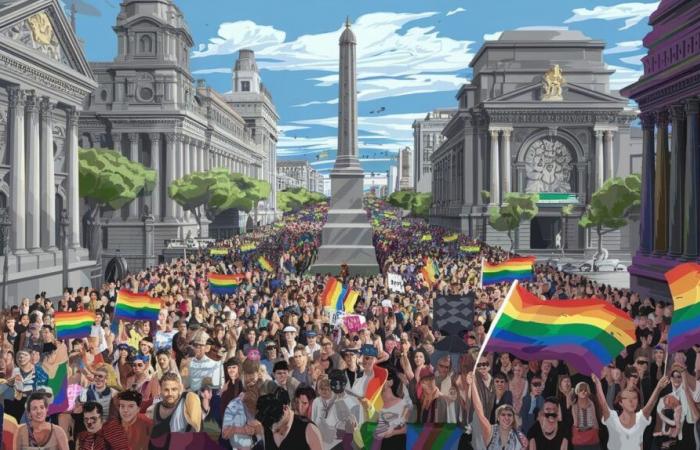Thousands of LGBT+ demonstrators march in Buenos Aires, protesting against austerity and the hostility of the Milei government. Between demands for rights and equality, the community expresses “the urgency to be visible” in the face of a climate perceived as discriminatory. Budget cuts in health, elimination of institutions… Discover the reasons for this unprecedented mobilization.
On this sunny November day in Buenos Aires, the streets of the Argentine capital were adorned with the colors of the rainbow. Thousands of people, flags and banners in hand, took to the asphalt for the annual LGBT+ Pride March. But behind the glitter and the music, the tone is serious. The demonstrators strongly denounce the hostility and austerity of the ultraliberal government of Javier Milei, perceived as a threat to their rights and freedoms.
The urgency of making ourselves visible
For Lucas Gutiérrez, a 43-year-old LGBT+ activist, this march is of particular importance this year. “In government, they utter insults against people of diversity without the slightest concern,” he confides, referring in particular to the controversial remarks of the Minister of Justice last August. The latter had expressed his rejection of “the diversity of sexual identities which do not correspond to biology”, calling them “subjective inventions”.
Faced with this climate, the demonstrators feel “an urgency to [se] make visible”. Emilce Gorosito, a 36-year-old civil servant who defines himself as a “trans transvestite”, insists: “More than ever we must return to the streets, where we learned to conquer our rights, this time to defend them”. Dressed in a tight silver jumpsuit, she says this is one of the most important marches given the political context.
Budget cuts that worry
Beyond the tone used by certain members of the government, it is the austerity measures that are causing concern. In the name of the objective of “zero budget deficit”, the Milei executive abolished the Ministry of Women and the Institute against Discrimination, among other cuts in the administration. Decisions seen as so many negative signals sent to LGBT+ communities.
In the health sector too, restrictions are being felt. An NGO denounced in the 2025 budget a 76% reduction in funds allocated to the fight against HIV, viral hepatitis and sexually transmitted infections. Already in 2024, the freeze on public purchases has led to shortages of medicines and condoms.
The freedom of the “life project” in question
However, President Javier Milei, who describes himself as “libertarian”, has in the past expressed his support for same-sex unions, in the name of the freedom of the “life project”. A position which seems in contradiction with the policy pursued since he came to power in December, considered discriminatory by many demonstrators.
We're not asking too much: basically, let them leave us alone!
Lucas Bouder, 25-year-old tour operator
For Lucas Bouder, a 25-year-old tour operator from Junin, a provincial town, it is above all about being able to live freely. “We’re not asking too much: basically, let them leave us alone!” he summarizes. He regrets an absence of positive signals from those in power, “which encourages hatred” according to him.
Concrete demands
Beyond the message sent by their massive presence in the streets, the demonstrators are making specific demands. Among the slogans of the “Marcha del Orgullo” this year: “No freedom without rights and public policies”, “No freedom with (budgetary) adjustment or repression”. The march also calls for “a comprehensive Trans Law and an anti-discrimination law”.
Demands which echo the concerns expressed by many participants, like Emilce Gorosito: “More than ever we must return to the streets, where we learned to conquer our rights, this time to defend them”. Because if the party was there with the colorful floats and the music, the time has come for mobilization for the Argentinian LGBT+ community, determined to defend its achievements and continue its fight for equality.
A clear message sent to the government
Through this 2024 Pride March, Argentina's LGBT+ community sent an unequivocal message to the Milei government. Despite a hostile context, she refuses to return to the shadows and intends to make her voice heard. For Lucas Gutiérrez, this march responds to “an urgency to make ourselves visible. (Say) we exist, we resist, we are and we will be!”
Essential visibility to continue to advance rights and combat discrimination, in an Argentina where LGBT+ people today feel threatened. A long-term fight, but one that the thousands of demonstrators present on Saturday are determined to continue, so that the colors of diversity continue to be proudly displayed in the streets of Buenos Aires and the country.






